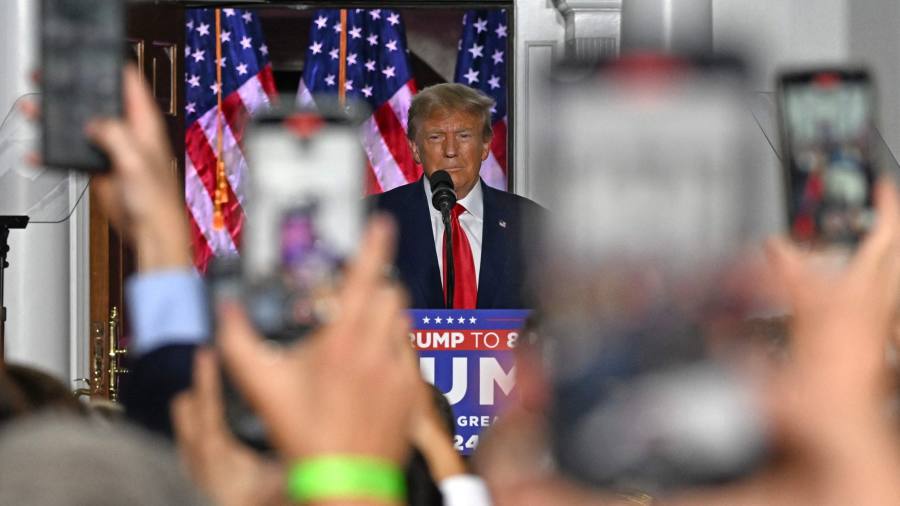Politics does not get simpler than this. American voters are likely to face a choice next year between a criminal defendant vowing retribution against his pursuers and another man. It will be a referendum on the rule of law.
Should the first man win, he will probably escape prison for his multiple alleged crimes. Should the second win, the first will in all likelihood go to jail. If democracy could be shrunk to one of those brutal reality TV games, this would be it. That, of course, is how Donald Trump likes it.
The question is not whether a victorious Trump would deploy the machinery of justice for personal ends. He has repeatedly declared he will use the law as a tool of revenge — and he would. It pays to take him literally.
The question is to what lengths Trump would go to stay out of jail. He will have nothing to lose. That is the spectre confronting the second man, Joe Biden.
Most Americans go through their lives without a felony to their name. Some get a record for relatively trivial things. Trump faces 71 felony counts on two sets of charge sheets — his hush money payments to a porn star and hiding highly classified documents. He could theoretically face centuries behind bars.
By the time the other investigations are over — on his attempts to subvert US democracy on 6 January 2021 and for trying to throw an election in Georgia — his charge sheet tally could well exceed 100.
It is a wonder any free society would reward such a candidate. Plenty have. Look at Italy’s late Silvio Berlusconi, who spent decades in a revolving door between election victories and the courtroom. Or Israel’s Benjamin Netanyahu, who wants to quash Israel’s independent judiciary in a bid to escape his day in court.
Such figures build a cult around themselves that ultimately has little to do with ideology. It is about what they are prepared to do to survive. They succeed by conflating their sense of persecution with wider feelings of victimhood.
That explains why Trump’s support among Republicans grows with each indictment. In some polls he now gets more than all the other candidates combined. By echoing his claim that Biden has weaponised the justice system, his rivals are ceding the narrative to him. If Trump is the system’s banner victim, why bother with his chorus?
It remains to be seen whether New Jersey’s former governor, Chris Christie, who is alone in attacking Trump head-on, will resonate. “Look at how angry he is,” Christie said of Trump this week. “It’s never about what’s being done to the country. It’s poor me, victim me.”
The conventional wisdom is that Trump’s legal jeopardy makes his party’s nomination more likely and his general election victory less so. The first is surely right. The second is open to doubt.
In both 2016 and 2020, Trump said repeatedly that the election would be rigged against him. In the first, it was merely his pride at stake. Though he won the electoral college, Trump’s vanity was sufficiently wounded to insist he had not lost the popular vote to Hillary Clinton. He even launched a fruitless inquiry to uncover electoral fraud.
Trump’s personal stakes in 2020 were higher than in 2016 since he had already been impeached once and was facing several probes, mostly into his business affairs. But this was obviously before he secreted dozens of boxes of classified materials at Mar-a-Lago, which led to his arraignment in Miami this week. Nor had he yet been accused of inciting an assault on Capitol Hill to prevent Biden’s victory from being ratified. It was also before he tried to bully Georgian election officials into changing the poll’s outcome.
In each of his first two elections, Trump nevertheless upended US norms. One of his 2016 rallying cries was the Clinton-targeted “lock her up”.
Those days seem tame by comparison. How much further would Trump go next year to keep himself out of prison? The question is rhetorical: we can only guess at what, if anything, he would not contemplate doing. On the plus side, a majority of US voters believe Trump’s criminal charges should make him ineligible to run again. On the minus, Trump’s character and methods were not exactly a mystery in 2016.
Most modern US elections begin with a roughly 50/50 handicap. Because of the quirks of the electoral college, Trump would need around 47 per cent of the vote to be within range of regaining the White House. That would be his get-out-of-jail-free card — and America’s funeral.
Read the full article here




